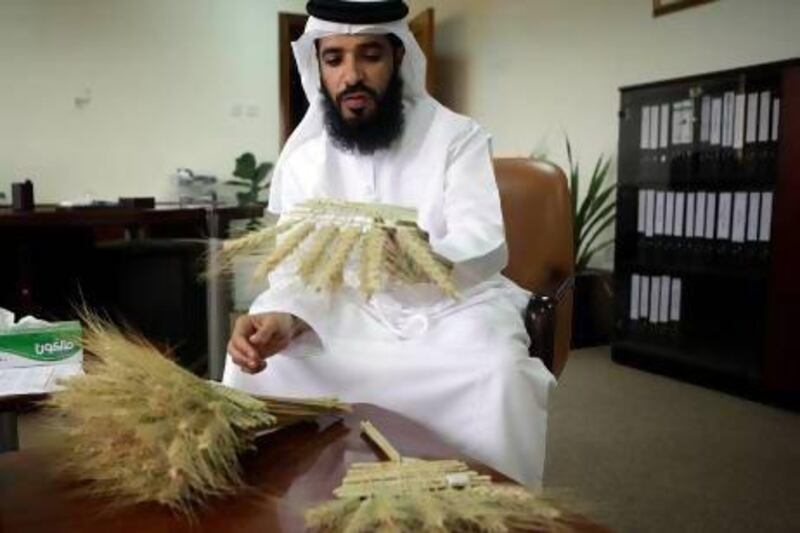AL AIN // Wheat flour could soon be produced in the UAE thanks to a research project launched by the Abu Dhabi Food Control Authority.
A research station in Al Ain's Al Salamat area is investigating what varieties of the cereal grain are most suitable for this climate.
"We are studying 100 varieties of wheat," said Dr Mohamed Al Hammadi, the authority's research and development director.
"About 90 were sourced from the International Maize and Wheat Improvement Centre in Mexico and the rest are from the region."
The seeds were shipped here three months ago as part of the authority's experiment to study the differences between varieties.
"We had three replicas of each variety and sowed them across our field with fixed irrigation and fertilisation," Dr Al Hammadi said.
Researchers covered the field with a white cotton sheet to protect the seeds from birds for a month. Once removed, the plants were exposed to the climate.
"We monitored their germination and made sure the birds didn't eat the stalks," Dr Al Hammadi said. "We developed a system that makes noise 24/7 to scare the birds away but we later noticed that they became familiar with it so we lost a bit of the plants. But we keep controlling the field."
During the plants' germination and flowering, scientists recorded their weight and height.
"We noticed strange symptoms, like a plant with two heads and one seed giving three stalks, so we recorded them," Dr Al Hammadi said. "The objective is to see which varieties of wheat are suitable for the UAE climate.
"We look at the quality, weight, height, the best yield, [resistance to disease] and the duration it takes to get the yield. We noticed very early production in the varieties."
Last month, the wheat plants were sent to the International Centre for Biosaline Agriculture in Dubai, where their grains were milled into flour.
They will sow in Baniyas next year and hope to repeat the success.
Previous efforts to grow wheat in the GCC have not worked out. Saudi Arabia plans to phase out its production in 2015 because of the high costs and water use.
"Water requirements and high temperature in summer months pose fundamental challenges," said Nicholas Lodge, an agricultural expert at Clarity, an Abu Dhabi consultancy.
"Far better to develop global alliances and relationships which need not necessarily involve actually investing in production itself, together with considering investment in other parts of the value-chain."
But the UAE's scientists intend to persevere.
"We need data for the future if we choose to grow wheat," Dr Al Hammadi said. "We need to find out if it is economically viable or not by evaluating the production."
Once researchers get the flour back from the centre in Dubai, which should be in the coming weeks, it will be weighed and analysed.
"The wheat will be studied for its resistance to disease, production components and growth parameters," said Mohamed Jalal Al Rayssi, the authority's communications director. "Those proven suitable for the UAE's climatic and environmental conditions will be selected and passed on to the farmers for cultivation. We are working on introducing improved and suitable varieties of crops to the farming sector in the UAE.
"Our efforts are aimed at raising the bar on farming in the emirate with a view to achieve better food security through sustainable farming practices."






